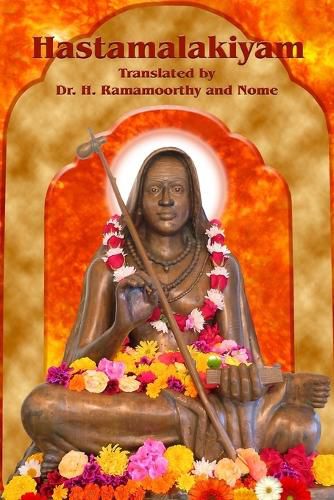Readings Newsletter
Become a Readings Member to make your shopping experience even easier.
Sign in or sign up for free!
You’re not far away from qualifying for FREE standard shipping within Australia
You’ve qualified for FREE standard shipping within Australia
The cart is loading…






This title is printed to order. This book may have been self-published. If so, we cannot guarantee the quality of the content. In the main most books will have gone through the editing process however some may not. We therefore suggest that you be aware of this before ordering this book. If in doubt check either the author or publisher’s details as we are unable to accept any returns unless they are faulty. Please contact us if you have any questions.
A young boy uttered a hymn to Adi Sankaracharya on how his identity of being the Self is as clear as a fruit in the hand in answer to the question who he is. As Self-Knowledge was as natural and evident to him as a fruit in one’s hand, he became famous under the name of Hastamalaka.
Hasta means hand, and amalaka is a small fruit with properties of rejuvenation.
Adi Sankaracharya wrote a commentary on these verses answering various doubts to make the experience of the Self self-evident to all.
Sri Ramana Maharshi also translated the verses to Tamil with some nuances that further make the Self-Knowledge self-evident.
Since these three works present the true nature of the Self so clearly, the English translation of the three works is being presented in this book.
The book starts with the story of Hastamalaka and flows into the hymn of Hastamalaka. It consists of twelve verses that succinctly reveal the Knowledge of the Self, proclaiming the identity of this eternal Knowledge and the Being of the Self. The hymn is addressed to Vishnu, the all-pervasive, the sustainer of the manifest world. The Sanskrit, English transliteration, and English translation of the verses are presented in the book.
Also included in the present volume are an English translation of the Tamil version of the text by Bhagavan Sri Ramana Maharshi and an English translation of Hastamalakiya-Bhashyam, which is the Sanskrit commentary by Adi Sankara upon these verses by his disciple.
$9.00 standard shipping within Australia
FREE standard shipping within Australia for orders over $100.00
Express & International shipping calculated at checkout
This title is printed to order. This book may have been self-published. If so, we cannot guarantee the quality of the content. In the main most books will have gone through the editing process however some may not. We therefore suggest that you be aware of this before ordering this book. If in doubt check either the author or publisher’s details as we are unable to accept any returns unless they are faulty. Please contact us if you have any questions.
A young boy uttered a hymn to Adi Sankaracharya on how his identity of being the Self is as clear as a fruit in the hand in answer to the question who he is. As Self-Knowledge was as natural and evident to him as a fruit in one’s hand, he became famous under the name of Hastamalaka.
Hasta means hand, and amalaka is a small fruit with properties of rejuvenation.
Adi Sankaracharya wrote a commentary on these verses answering various doubts to make the experience of the Self self-evident to all.
Sri Ramana Maharshi also translated the verses to Tamil with some nuances that further make the Self-Knowledge self-evident.
Since these three works present the true nature of the Self so clearly, the English translation of the three works is being presented in this book.
The book starts with the story of Hastamalaka and flows into the hymn of Hastamalaka. It consists of twelve verses that succinctly reveal the Knowledge of the Self, proclaiming the identity of this eternal Knowledge and the Being of the Self. The hymn is addressed to Vishnu, the all-pervasive, the sustainer of the manifest world. The Sanskrit, English transliteration, and English translation of the verses are presented in the book.
Also included in the present volume are an English translation of the Tamil version of the text by Bhagavan Sri Ramana Maharshi and an English translation of Hastamalakiya-Bhashyam, which is the Sanskrit commentary by Adi Sankara upon these verses by his disciple.